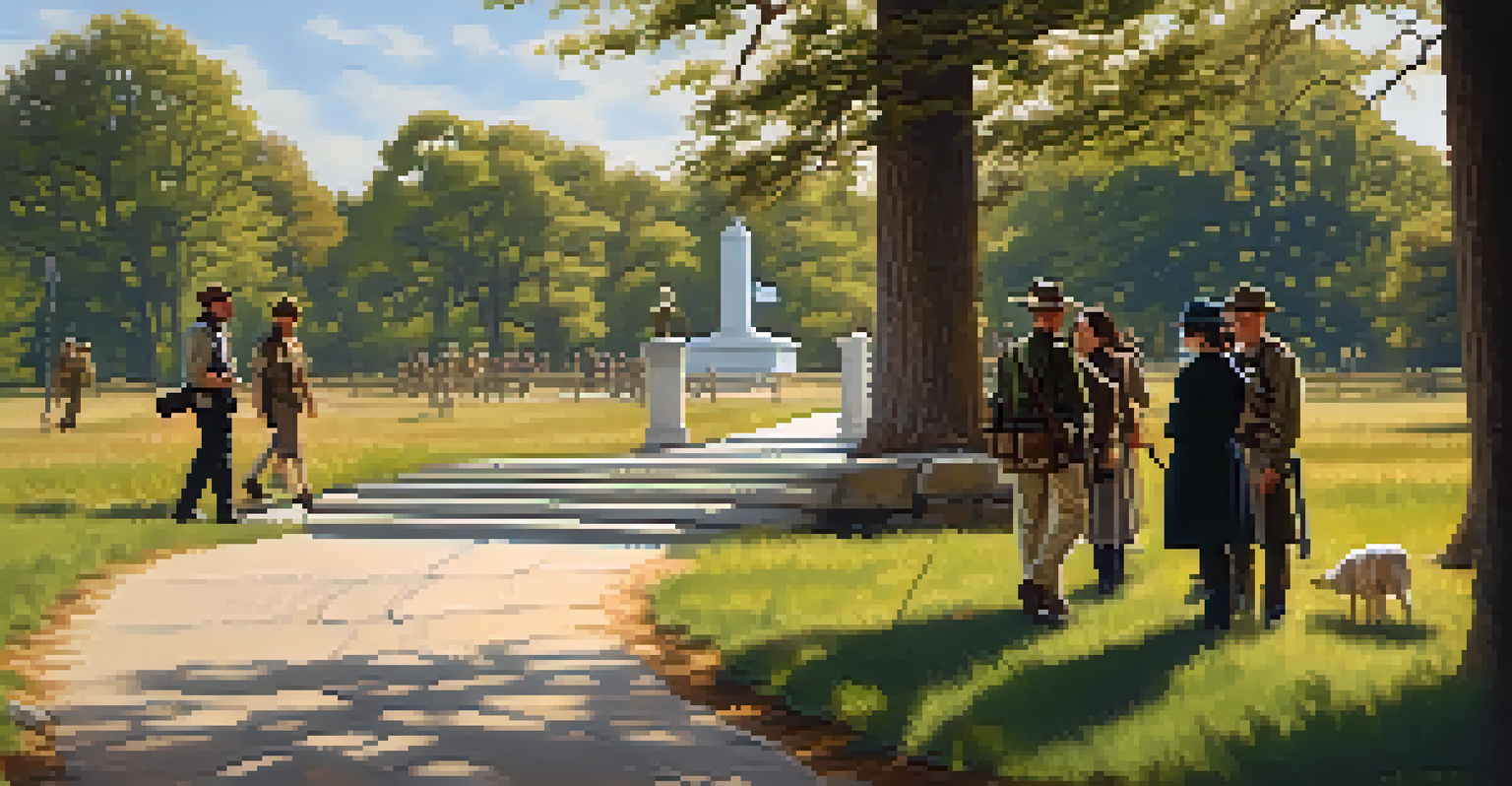Visiting Gettysburg: The Turning Point of the Civil War

The Historical Context of the Battle of Gettysburg
The Battle of Gettysburg, fought from July 1 to July 3, 1863, was a critical turning point in the American Civil War. At this juncture, the Confederate Army, led by General Robert E. Lee, sought to invade the North and secure a decisive victory. Understanding the series of events that led to this monumental clash helps us appreciate its significance.
The world will little note, nor long remember what we say here, but it can never forget what they did here.
Tensions had been escalating for years, with the nation divided over issues like slavery and states' rights. Just prior to Gettysburg, the Confederates had won several battles and were emboldened by their successes. This backdrop sets the stage for a confrontation that would change the course of the war and American history.
Visiting Gettysburg today allows you to walk the same grounds where thousands fought and fell. The rich history surrounding the battle provides a deeper understanding of the sacrifices made and the stakes involved for both the Union and the Confederacy.
Key Events of the Battle: A Day-by-Day Breakdown
The battle unfolded over three grueling days, with intense fighting that would leave the town of Gettysburg forever marked by the conflict. On the first day, Union forces were pushed back, but they managed to regroup on higher ground. This initial clash set the tone for the fierce battles that lay ahead.

On the second day, the fighting intensified as both sides made strategic moves. The Union held key positions, including Little Round Top, which proved crucial in repelling Confederate assaults. These tactical decisions showcased the importance of terrain in military strategy and the desperate stakes for both armies.
Gettysburg: A Turning Point
The Battle of Gettysburg marked a significant turning point in the American Civil War, influencing the war's momentum and shaping American history.
The final day, famously marked by Pickett's Charge, saw a dramatic and ill-fated Confederate assault on Union lines. This event is often remembered as a symbol of the bravery and tragedy of the conflict. The culmination of these three days not only marked a turning point in the war but also left a lasting legacy on American soil.
The Aftermath: Impact on the Civil War
The aftermath of Gettysburg was profound, with the Union Army emerging victorious, which boosted Northern morale. This victory, combined with the concurrent fall of Vicksburg, marked a significant shift in the war's momentum. The defeat also had a demoralizing effect on the Confederacy, impacting their ability to maintain support.
In great deeds, something abides. On great fields, something stays. Forms change and pass; bodies disappear; but spirits linger, to consecrate ground for the vision-place of souls.
The battle resulted in staggering casualties, with approximately 51,000 soldiers killed, wounded, or missing. The sheer scale of loss underscored the war's brutality and the human cost of conflict. Memorials and cemeteries now stand in honor of those who fought, reminding us of the sacrifices made.
Ultimately, Gettysburg represented not just a military turning point but also a moral one, reinforcing the Union's commitment to preserving the nation. The battle's legacy continues to shape discussions about freedom, equality, and national identity.
Visiting Gettysburg: A Journey Through History
Today, Gettysburg is a must-visit destination for anyone interested in American history. The Gettysburg National Military Park offers visitors a chance to explore the battlefield, guided by knowledgeable rangers who bring the history to life. Walking the hallowed grounds, you can almost feel the echoes of the past.
In addition to the battlefield, the town of Gettysburg itself is rich with historic sites, including homes, museums, and monuments. The Gettysburg Museum and Visitor Center provides invaluable context, featuring exhibits that delve into the events leading up to the battle and its aftermath. This blend of education and exploration enhances the overall experience.
Legacy of Sacrifice and Reflection
The legacy of Gettysburg serves as a powerful reminder of the sacrifices made during the Civil War and the ongoing relevance of its lessons on unity and freedom.
Whether you are a history buff or simply curious about America's past, a visit to Gettysburg is both enlightening and moving. It’s a powerful reminder of the complexities of our history and the enduring lessons we can learn from it.
The Role of Gettysburg in American Memory
Gettysburg holds a special place in the American collective memory, often viewed as a symbol of sacrifice and resilience. This battlefield has been immortalized in countless books, films, and speeches, most notably President Abraham Lincoln's Gettysburg Address. His words continue to resonate, encapsulating the ideals of freedom and equality.
The importance of remembering Gettysburg extends beyond just its historical significance; it serves as a reminder of the consequences of division and conflict. The lessons learned here are relevant today as we navigate our own societal challenges. Visiting Gettysburg offers a chance to reflect on these issues in a profound way.
Moreover, many visitors leave with a renewed sense of appreciation for the values of unity and democracy. The stories of bravery and sacrifice remind us that the struggle for a better future is ongoing, and that we must remain vigilant in preserving those ideals.
Plan Your Trip: Practical Tips for Visitors
Planning a trip to Gettysburg can be both exciting and overwhelming, but a little preparation goes a long way. Start by checking out the Gettysburg National Military Park website for information on visitor hours, guided tours, and special events. Knowing what to expect will help you make the most of your visit.
Consider timing your visit during the shoulder seasons of spring and fall, when the weather is pleasant and crowds are smaller. This allows for a more intimate experience as you explore the battlefield and engage with rangers. Additionally, don’t forget to wear comfortable shoes; you'll be doing quite a bit of walking!
Visiting Gettysburg Today
A trip to Gettysburg offers a unique opportunity to engage with history, explore the battlefield, and reflect on the enduring values of democracy and resilience.
Lastly, take advantage of local resources, like visitor centers and local guides, to enhance your experience. They can provide valuable insights and recommendations on where to eat and stay. With a bit of planning, your visit to Gettysburg will be both enjoyable and memorable.
Conclusion: Reflecting on Gettysburg's Legacy
As we conclude our exploration of Gettysburg, it's clear that its legacy is woven into the fabric of American history. This battlefield stands as a testament to the sacrifices made during one of the nation's darkest times. By understanding its significance, we honor those who fought and reflect on the lessons learned.
Visiting Gettysburg is not just about witnessing history; it's about engaging with it on a personal level. Each visitor leaves with a unique perspective shaped by their own reflections and experiences. This interaction with the past helps keep the memory of Gettysburg alive for future generations.

In our ever-evolving society, the values represented at Gettysburg continue to inspire dialogue about freedom, unity, and the importance of understanding our shared history. So, whether you're a history enthusiast or a casual traveler, Gettysburg invites you to connect with the past and consider its relevance in shaping our future.